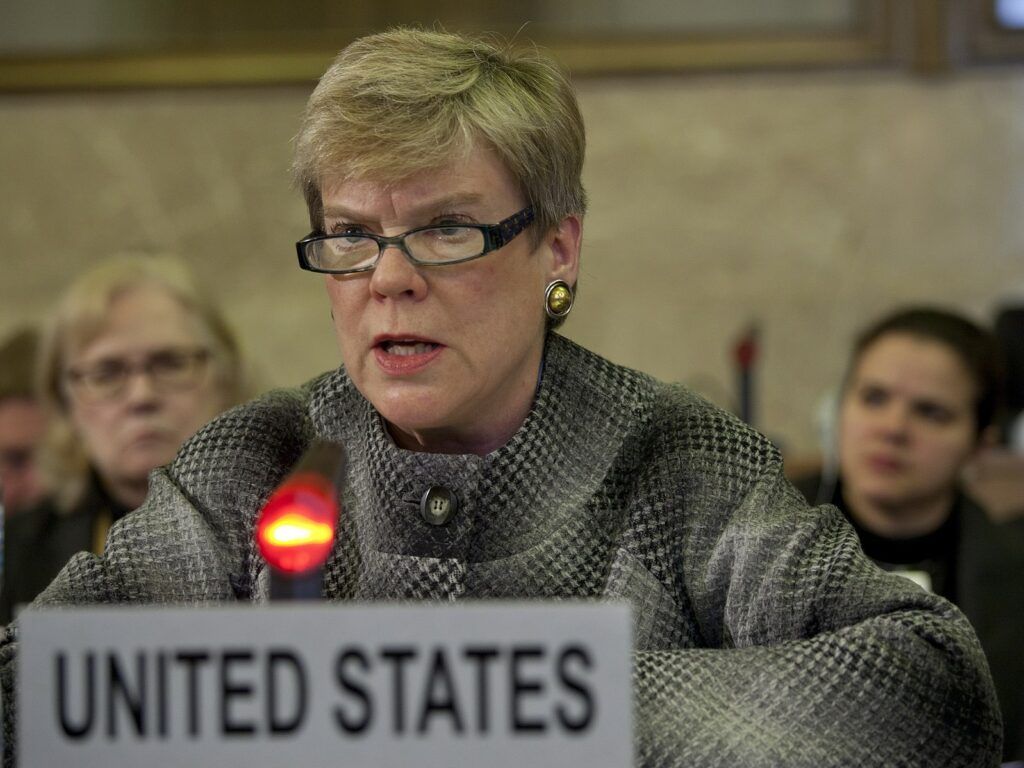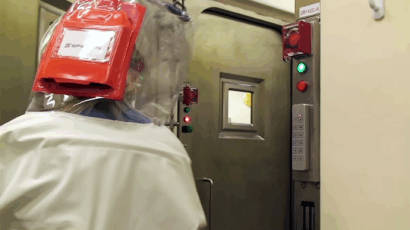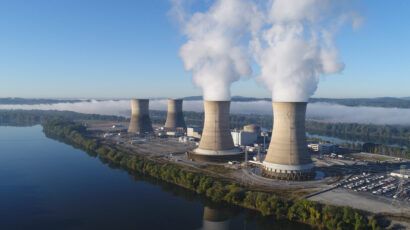Interview: Rose Gottemoeller on the precarious future of arms control
By Laurel Baker | July 29, 2024
 Assistant Secretary of State Rose Gottemoeller delivers US opening statement at Conference on Disarmament in Geneva, Switzerland on January 24, 2012.
Assistant Secretary of State Rose Gottemoeller delivers US opening statement at Conference on Disarmament in Geneva, Switzerland on January 24, 2012.
On May 1, Laurel Baker sat down with Rose Gottemoeller, former Deputy Secretary General of NATO, chief US negotiator of the New Strategic Arms Reduction Treaty (New START), and accomplished lecturer. (The Bulletin recently welcomed Gottemoeller to its Board of Sponsors.) The interview covered the current nuclear threat matrix, including insights on the effects of emerging technologies on strategic stability; Russian and Chinese nuclear challenges; and lessons learned from high-stakes arms control negotiations.
(This interview has been edited for brevity and clarity.)
Laurel Baker: Washington is vocally wary of Russian saber-rattling right now. How has your perception of Russian nuclear credibility evolved since the start of the full-scale war in Ukraine, especially following threats of tactical nuclear weapon use?
Rose Gottemoeller: There is a certain stability—often, it seems like a tenuous stability—to the fact that the United States and Russia, which are the two biggest nuclear powers, each have around 4,000 warheads, of which roughly 1,500 are deployed on long-range intercontinental delivery systems of various kinds, like missiles and bombers. So, having this parity between our two nuclear arsenals has resulted in a stability of deterrence over the past 60-plus years.
After the Cuban Missile Crisis, [the two countries] did work to reduce and eliminate nuclear weapons over time. Frankly, that’s something that has now been thrown into doubt. We are at a dangerous moment now when [Russian President Vladimir] Putin is behaving unpredictably.
I do think that there is a difference between the political use to which Putin is putting nuclear threats at this moment, rattling the nuclear saber, and what we see in terms of the military nuclear establishment in Russia taking action. This is something that [US President Joe] Biden and his administration have [said] several times—that we do not see the readiness of Russian nuclear forces really being raised in any way, do not see any changes in the status of Russian nuclear forces that would give rise to alarm, [and do not see] that they are getting closer to pursuing some kind of nuclear use scenario.
Baker: How would you describe the state of dialogue between the United States and Russia concerning the US strategic posture, and what is the United States doing to remedy Russian concerns?
Gottemoeller: I’m not sure they are sincere concerns, but, as always, they talk about what they see in terms of the development—the modernization—of the United States nuclear triad that is taking place. It’s the so-called “program of record” that President [Barack] Obama first launched in the 2010s and which is proceeding now—and they say this is a modernization about which they, the Russians, are concerned. However, I like to point out two things about the “program of record” nuclear modernization. The first is that the Russians have already been modernizing their nuclear triad and have pretty much completed it at this point. So, it makes me smile when they say they’re concerned about the United States’ nuclear modernization because they’ve already undertaken one. But the second thing that I like to stress is that the US nuclear modernization is taking place under the limits of New START, so we are allowed to deploy 700 delivery vehicles—missiles and bombers—and we’re allowed to deploy 1,550 nuclear warheads. So, it’s not about a buildup or a nuclear arms race—the modernization that we are undertaking. But it is about a replacement of obsolescent systems that are no longer safe to operate. I agree with what President Obama said: “As long as nuclear weapons exist, we must maintain [a] safe, secure, and effective arsenal.”
Baker: Moscow has justified non-participation in the Anti-Ballistic Missile (ABM) Treaty, START II, the Comprehensive Nuclear Test Ban Treaty (CTBT), and other treaties on grounds that the United States was non-party or non-compliant. To what extent do you think these criticisms are justified?
Gottemoeller: It’s another case of the pot calling the kettle black. The Russians themselves built a missile called the 9M729 that was a stark violation of the Intermediate-Range Nuclear Forces (INF) Treaty. On that basis, the Trump administration withdrew from the treaty. As far as ABM is concerned, the [George W.] Bush administration felt very strongly that we should have free reign to modernize our ballistic missile defenses, and they believed that the ABM Treaty too sharply constrained our ability to modernize missile defenses. Frankly, I did not agree with either of those withdrawals—from the INF and ABM treaties—but those were the decisions made by President Trump and President Bush. But I think it’s important to remember that, as far as compliance concerns go, the United States legally exercised the withdrawal clause from those two treaties in both cases. In terms of non-compliance or violation of treaties, it’s really the Russians who have been causing those concerns.
Baker: What opportunities do you see ahead for the United States to reengage with Russia on arms control and nonproliferation initiatives post-New START?
Gottemoeller: I’d take it stepwise, to be honest, and start with this problem we were just talking about, which is banning intermediate-range, ground-launched nuclear missiles. Even after the US withdrawal from the INF Treaty, Putin and Russia put forward a couple of offers for a moratorium in Europe on such systems. The first one was ridiculous, because it would have constrained US systems but would not have touched this Russian missile we were concerned about—the 9M729. But later, in October 2020, Putin put forth a new offer of a moratorium on these missiles in Europe, and he offered to constrain the 9M729 and have verification and monitoring measures to ensure it was kept out of European Russia. So, that’s the kind of idea we would start with, because the Russians have shown interest in it in the past, and it came from the president.
By the way, Xi Jinping also expressed interest in a moratorium on INF missiles in Asia when he and Vladimir Putin got together in February 2022, right before the Russians invaded Ukraine for the second time. They spoke about having parallel moratoriums on INF missiles in Europe and Asia. So, frankly, I would start there and try to get working in that area. I would leave the limits of New START in place and then think about what we can do further.
As far as a treaty is concerned, or more of an executive agreement, I don’t think we need to decide that first. I think we need to negotiate what constraints and limits are important going forward, taking into account the new Chinese nuclear capabilities that are emerging, and see what kind of constraints and limits we can think about. To my mind, there’s room for further reductions, but that’s quite controversial. A number of people say we can’t possibly reduce anymore with the Chinese building up, but I like to say we have a window of opportunity now because the Chinese are still at a much lower number than ours—500 total warheads. Remember, we have approximately 4,000 total warheads and roughly 1,500 of those are deployed. So, I think we have some room, first of all, to negotiate with the Russians, and we have some room certainly to engage the Chinese and talk to them about what their objectives are and what we need to do to continue to control and constrain nuclear weapons.
Baker: Emerging technologies like hypersonic missiles, quantum computing, and artificial intelligence are posing new challenges to strategic stability. What do you view as the highest-risk technological advancements in the nuclear domain, and how can arms control frameworks adapt to address them?
Gottemoeller: I’ve written about the way that, as time goes on, we are becoming more and more technologically adept at detection, and I think quantum detection is playing into this. As time goes by, are we going to undermine our ability to retaliate? That’s the thing, it’s our insurance policy. The United States and Russia have this tenuous balance of strategic forces we call first-strike deterrence. Neither side has a majority or a superiority in nuclear weapons, so they can’t strike and attack the other side and destroy the other side without undergoing annihilation. It’s that balance of terror. But, in any event, we sustain—and the Russians, Chinese, United Kingdom, France, nuclear weapons states sustain—some secure second-strike capability. So, even if an adversary somehow got off a first strike, there’s always an ability to strike second or retaliate.
I’m concerned that, as time goes by, we may be undermining the security of that second-strike deterrent if new technologies give us an excellent capability to find and target second-strike retaliatory capabilities such as submarines. It’s a longstanding anxiety of the US Navy that the seas would become more transparent and submarines more vulnerable to attack. It’s not now, it’s not next year, but I do think that with these new detecting capabilities becoming available, driven by new technology, driven by the ability to also make sense out of the imagery and the data that we’re receiving, that the stability of the second-strike deterrent could be undermined. To my mind, that’s a big risk for the future.
Again, it means we need to get back to the negotiating table and find ways to assure each other that second-strike deterrent capabilities will remain survivable. That’s a hard task, but that’s how I see it.
Baker: Now, specifically on AI and autonomous systems in the nuclear space—how do you think about worldwide understandings of the “human in the loop”?
Gottemoeller: There’s no disagreement, as far as I can tell, among the P5 [permanent members of the UN Security Council], that there must be this leadership presence—a “human in the loop”—who would be responsible or have sole authority for this momentous decision.
What concerns me most is the differential that’s developing in AI capability. I understand that Russia is behind or maybe not even participating in this race because of the other concerns on the mind of Vladimir Putin—fighting the war in Ukraine. I think a lot of Russian science and technology is falling behind for that reason. But the United States and China are very much in the race, and that’s what concerns me here—that there could be different thought patterns that could be going on between Beijing and Washington on a number of issues having to do with the implications of AI.
Baker: Do you think conventional wisdom in Washington gets anything wrong about China’s conventional and/or nuclear postures or ambitions?
Gottemoeller: Regarding China, we just have a lack of knowledge because they have traditionally called transparency a window into their weaknesses. We consider transparency an element of predictability, which is very important for nuclear [stability]. That’s the biggest difficulty right now because it does contribute to a notion that the Chinese are 10 feet tall and they’re growing to 20 feet tall.
Baker: Given that the Chinese nuclear enterprise is a black box, to what extent do you feel that Beijing should be incorporated into a multilateral venue with Russia on nuclear issues?
Gottemoeller: I think the Chinese have been very intensively participating in a couple of multilateral venues—the NPT regime is one of them; another is the CTBT, which has its implementing body in Vienna. So we do know that the Chinese are willing—and they participate in the International Atomic Energy Agency. They’re active on the board of governors there. So, in certain multilateral venues, they’re both comfortable and can be productive and [engage in] problem-solving. To say that the Chinese are unwilling to talk about nuclear weapons anywhere is wrong, but what we need now is to open the discourse between Washington and Beijing on these matters. To my mind, the only way to do that is bilaterally. The Trump administration tried to force the Chinese to the multilateral table with Russia and the United States, which doesn’t make any sense. Again, the United States and Russia deploy roughly 1,500 warheads out of about 4,000 warheads each. The Chinese deploy a minority of their approximately 500 warheads, so you just can’t force them to a table where they are so unequal. It doesn’t make any sense; I see no negotiation formula that makes sense in that context.
But, bilaterally, again, [it would be helpful] to open up a discussion about where they’re headed, what they want to achieve with their modernization, what kind of controls they think would be useful. Of course, that would have to be a reciprocal matter. They’ll want controls on our systems, as we want controls on theirs. That’s a matter between us, and we must also continue our negotiations with Russia regarding the strategic arms reduction and limitation process.
Baker: How might good-faith compromises manifest in future arms control negotiations, especially after US policymakers have lost so much faith in Russian leadership and, to some extent, credibility?
Gottemoeller: I think the wisest advice I’ve ever heard was related to the Colombian peace process, when one of the senior negotiators said, “If you cannot trust the people, you trust the process, and if the process is producing results, and the other side is fulfilling its obligations and commitments under the agreement and you can verify that”—that’s why monitoring and verification is so important, you have to know that they’re actually implementing—”then you continue forward with implementing the agreement or the treaty overall.”
[Regarding the Russians], again, you have to just see if they are willing to perform on the basis of what they’ve committed to. I do object to people saying we can’t negotiate with the Russians. I think there will be a long period when we’ll have very little trust or confidence in the Russians in any way, shape, or form. But it’s important to think about nuclear weapons and nuclear weapons arms control as being associated with constraining and ensuring that an existential threat to humanity does not get out of hand. For that reason, it’s worth it.
Baker: Finally, having been a negotiator and top NATO official, to what extent do you think NATO can and/or should play an administrative role in future nuclear stability structures?
Gottemoeller: NATO member states’ role will be a necessary one should we place constraints on intermediate-range missiles in Europe. We talked about having a European moratorium on ground-launched intermediate-range missiles. I think that’s the most important thing—that NATO member states should be knowledgeable and ready to participate in future arms control activities, such as a new INF moratorium. And, indeed, they participated in the first INF Treaty’s monitoring and verification regime as long as it lasted. The last missiles were destroyed in 1991 and the on-site inspection regime ended in 2001, but there was a good deal of experience that the NATO member states had in participating. NATO needs to be involved and knowledgeable.
Together, we make the world safer.
The Bulletin elevates expert voices above the noise. But as an independent nonprofit organization, our operations depend on the support of readers like you. Help us continue to deliver quality journalism that holds leaders accountable. Your support of our work at any level is important. In return, we promise our coverage will be understandable, influential, vigilant, solution-oriented, and fair-minded. Together we can make a difference.
Keywords: AI, China, INF Treaty, Putin, Russia, arms control, nuclear modernization
Topics: Interviews, Nuclear Weapons, Voices of Tomorrow















